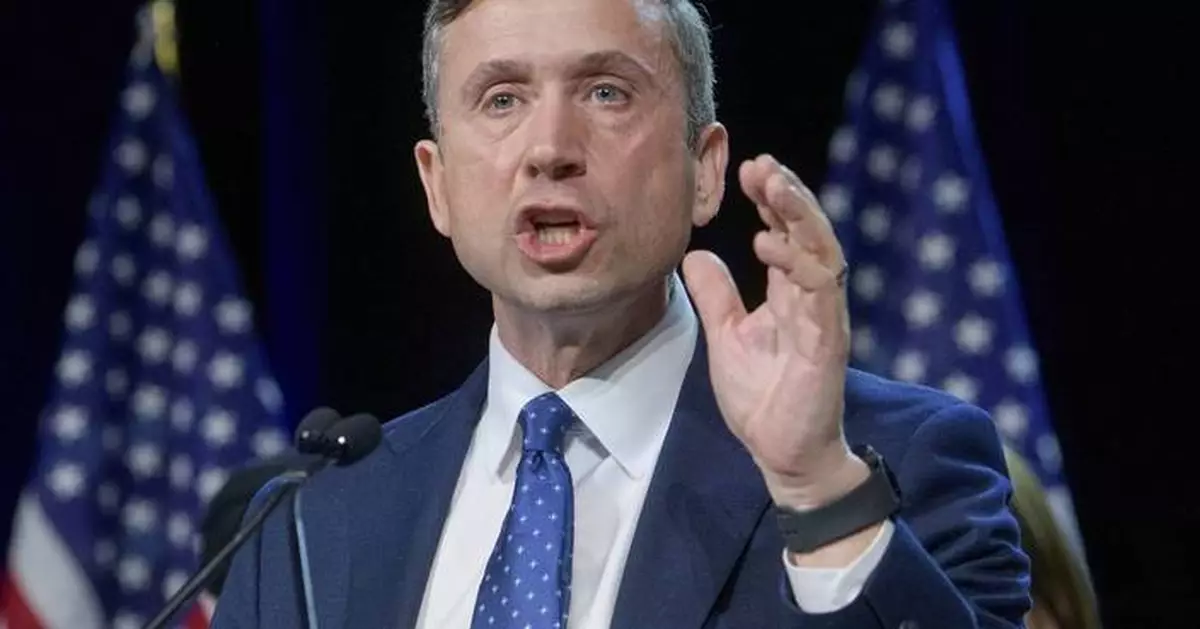PHOENIX (AP) — Democratic National Committee Chair Ken Martin said Thursday that party officers should be banned from taking sides in primaries, countering DNC Vice Chair David Hogg's plan to raise money for candidates challenging Democratic incumbents.
Martin's proposal escalates a public feud between the new DNC boss and Hogg, who rose to prominence as a gun-control advocate after surviving the 2018 school shooting in Parkland, Florida. Both were elected by DNC members earlier this year.
Martin said he's drafting proposed bylaw changes to require officers to remain neutral in all Democratic primaries.
Martin said party neutrality is crucial to maintaining the confidence of voters, pointing to the bitter feud that emerged after supporters of Sen. Bernie Sanders’ 2016 campaign believed he was stymied by party insiders putting their thumb on the scale in favor of Hillary Clinton, who won the nomination but went on to lose the general election to Donald Trump.
“You can’t be both the player and the referee,” Martin wrote in an opinion piece published by Time.
Hogg has said he'll raise millions of dollars through a political action committee unaffiliated with the DNC to support primary challengers running against longtime incumbents in solidly Democratic congressional districts. He says the party needs a shakeup to bring in leaders who will more aggressively confront Trump and connect with younger voters.
Hogg said in a statement posted on social media that he is not breaking any current DNC rules, and his actions don't interfere with the party's responsibilities, including setting a presidential nominating calendar, supporting state Democratic parties, building data infrastructure and creating the campaign infrastructure for a future Democratic presidential nominee.
Voters don't view Democrats as a “real alternative to the Republican Party,” he said.
“That will not change if we keep the status quo,” Hogg said. “We have no other option but to do the hard work of holding ourselves and our own party accountable.”
Also on Thursday, Martin said the DNC would increase its financial support for state Democratic parties by $5,000 to $17,500 per month, with an additional $5,000 monthly for Republican-led states.

FILE - David Hogg talks to people after speaking at the 60th Anniversary of the March on Washington at the Lincoln Memorial in Washington, Aug. 26, 2023. (AP Photo/Andrew Harnik, File)
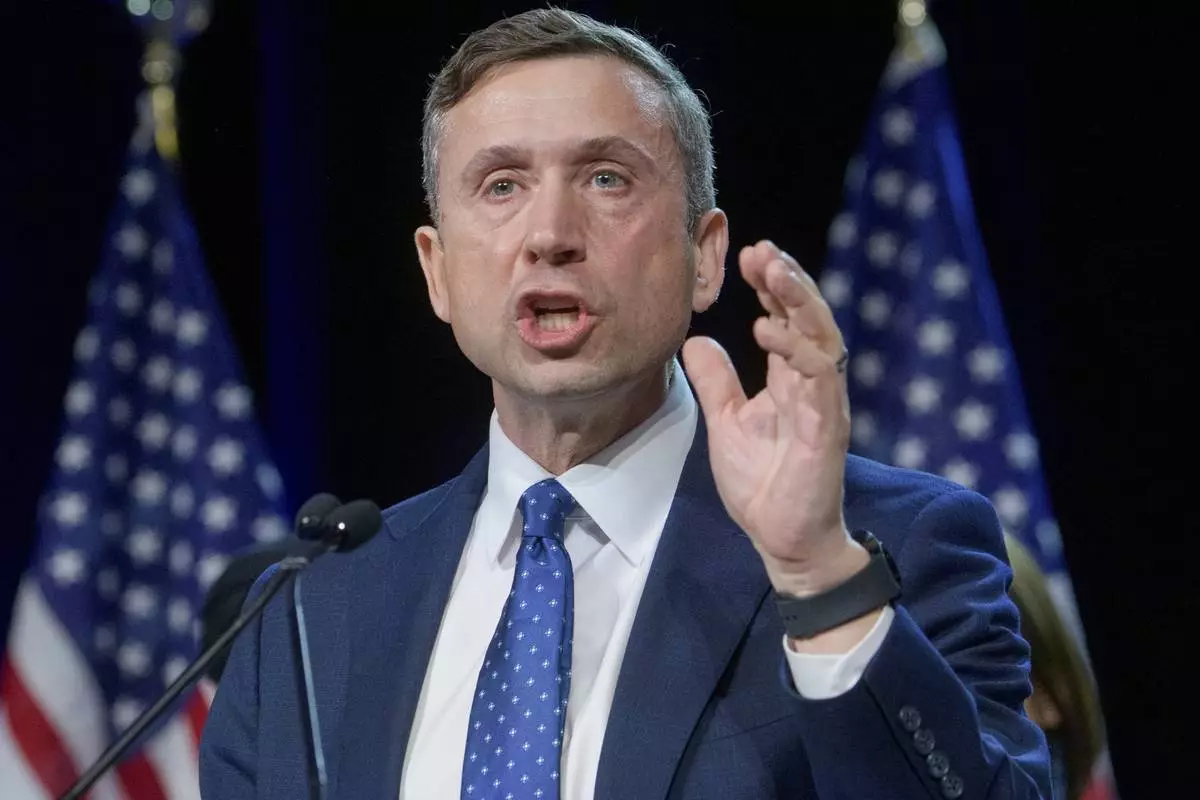
FILE - Democratic National Committee chairman Ken Martin speaks after winning the vote at the Democratic National Committee winter meeting at the Gaylord National Resort and Convention Center in National Harbor, Md., Feb. 1, 2025. (AP Photo/Rod Lamkey, Jr., File)
WASHINGTON (AP) — In a massive setback, House Republicans failed Friday to push their big package of tax breaks and spending cuts through the Budget Committee, as a handful of conservatives joined all Democrats in a stunning vote against it.
The hard-right lawmakers are insisting on steeper spending cuts to Medicaid and the Biden-era green energy tax breaks, among other changes, before they will give their support to President Donald Trump's "beautiful” bill. They warn the tax cuts alone would pile onto the nation's $36 trillion debt.
The failed vote, 16-21, stalls, for now, House Speaker Mike Johnson's push to have the package approved next week. But the holdout lawmakers vowed to stay all weekend to negotiate changes as the Republican president is returning to Washington from the Middle East.
“Something needs to change or you’re not going to get my support,” said Rep. Chip Roy, R-Texas.
Tallying a whopping 1,116 pages, the One Big Beautiful Bill Act, named with a nod to Trump, is teetering at a critical moment.
The conservatives are holding out for steeper cuts while GOP lawmakers from high-tax states including New York are demanding a deeper tax deduction, known as SALT, for their constituents. Johnson, with few votes to spare from his slim majority, has insisted Republicans will are on track with the sprawling package that he believes will inject a dose of stability into a wavering economy.
Ahead of Friday's vote, Trump had implored his party to fall in line.
“Republicans MUST UNITE behind, ‘THE ONE, BIG BEAUTIFUL BILL!’” the president posted on social media. "We don’t need ‘GRANDSTANDERS’ in the Republican Party. STOP TALKING, AND GET IT DONE!”
Democrats slammed the package as a “big, bad bill," or as Rep. Pramila Jayapal, D-Wash., called it, “one big, beautiful betrayal.”
They emphasized that millions of people would lose their health coverage and food stamps assistance if the bill passes while the wealthiest Americans would reap enormous tax cuts. They also said it would increase future deficits.
“That is bad economics. It is unconscionable,” said Rep. Brendan Boyle, the top Democratic lawmaker on the panel.
The Budget panel is one of the final stops before the package is sent to the full House floor for a vote, which is expected as soon as next week. Typically, the job of the Budget Committee is more administrative as it compiles the work of 11 committees that drew up various parts of the big bill.
But Friday's meeting proved momentous even before the votes were tallied. The conservatives, many from the Freedom Caucus, had been warning they would block the bill, using their leverage to demand further changes. Republicans hold a slim majority in the House and have just a few votes to spare to advance the measure.
Four Republican conservatives initially voted against the package — Roy and Reps. Ralph Norman of South Carolina, Josh Brecheen of Oklahoma, Rep. Andrew Clyde of Georgia. Then one, Rep. Lloyd Smucker of Pennsylvania, switched his vote to no.
“Sadly,” Norman said, “I’m a hard no until we get this ironed out.”
In their push for deeper spending reductions, the conservatives are particularly eyeing Medicaid, the health care program for some 70 million Americans. They want new work requirements for aid recipients to start immediately, rather than on Jan. 1, 2029, as the package proposes.
Smucker said afterward he was confident “we’re going to get this done.”
At the same time, the New Yorkers have been unrelenting in their demand for a much larger SALT deduction than what is proposed in the bill, which could send the overall cost of the package skyrocketing. Those talks are also underway.
As it stands, the bill proposes tripling what's currently a $10,000 cap on the state and local tax deduction, increasing it to $30,000 for joint filers with incomes up to $400,000 a year.
Rep. Nick LaLota, one of the New York lawmakers leading the SALT effort, said they have proposed a deduction of $62,000 for single filers and $124,000 for joint filers.
The conservatives and the New Yorkers are at odds, each jockeying for their priorities as Johnson labors to keep the package on track to pass the House by Memorial Day and then onto the Senate.
At its core, the sprawling package extends the existing income tax cuts that were approved during Trump's first term, in 2017, and adds new ones that the president campaigned on in 2024, including no taxes on tips, overtime pay and some auto loans.
It increases some tax breaks for middle-income earners, including a bolstered standard deduction of $32,000 for joint filers and a temporary $500 boost to the child tax credit, bringing it to $2,500.
It also provides an infusion of $350 billion for Trump’s deportation agenda and to bolster the Pentagon.
To offset more than $5 million in lost revenue, the package proposes rolling back other tax breaks, namely the green energy tax credits approved as part of President Joe Biden's Inflation Reduction Act. Some conservatives want those to end immediately.
The package also seeks to cover the costs by slashing more than $1 trillion from health care and food assistance programs over the course of a decade, in part by imposing work requirements on able-bodied adults.
Certain Medicaid recipients would need to engage in 80 hours a month of work or other community options to receive health care. Older Americans receiving food aid through the Supplemental Nutrition Assistance Program, known as SNAP, would also see the program's current work requirement for able-bodied participants without dependents extended to include those ages 55-64. States would also be required to shoulder a greater share of the program's cost.
The nonpartisan Congressional Budget Office estimates at least 7.6 million fewer people with health insurance and about 3 million a month fewer SNAP recipients with the changes.
Associated Press writer Leah Askarinam contributed to this report.
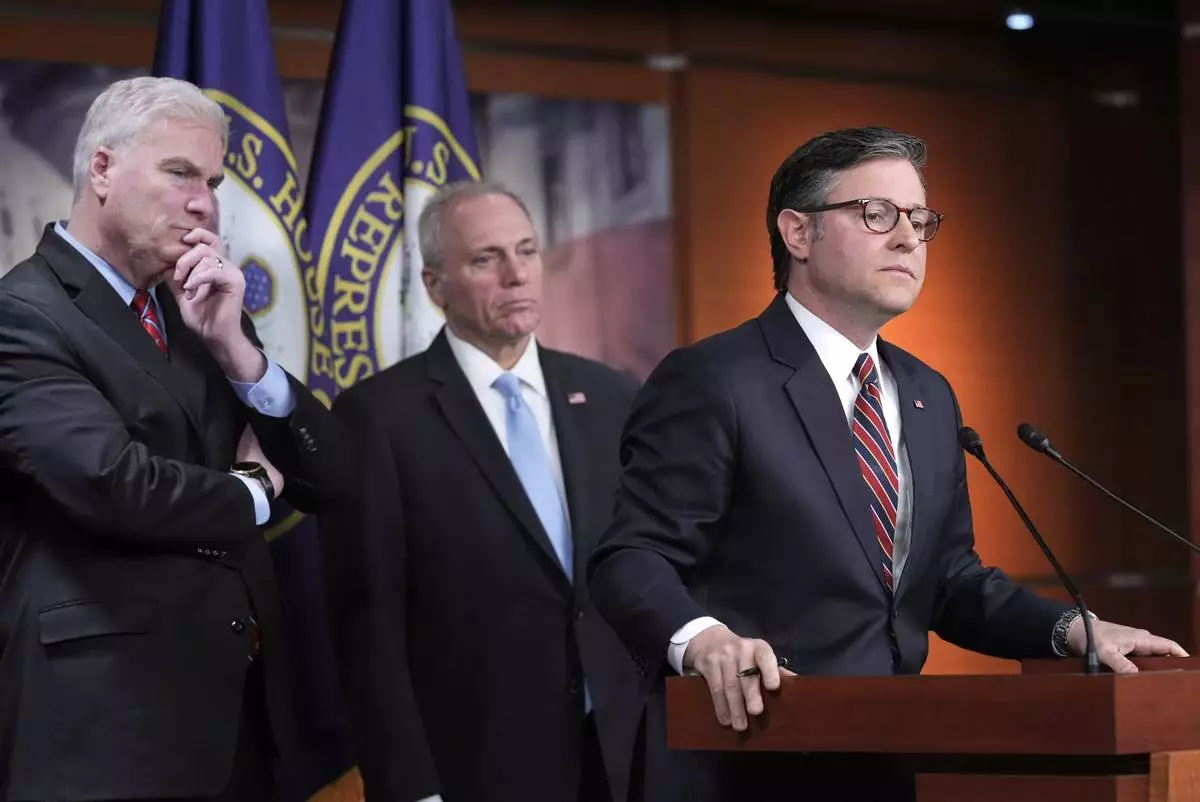
FILE - Speaker of the House Mike Johnson, R-La., joined from left by House Majority Whip Tom Emmer, R-Minn., and House Majority Leader Steve Scalise, R-La., talks to reporters at the Capitol in Washington, April 8, 2025. (AP Photo/J. Scott Applewhite, File)
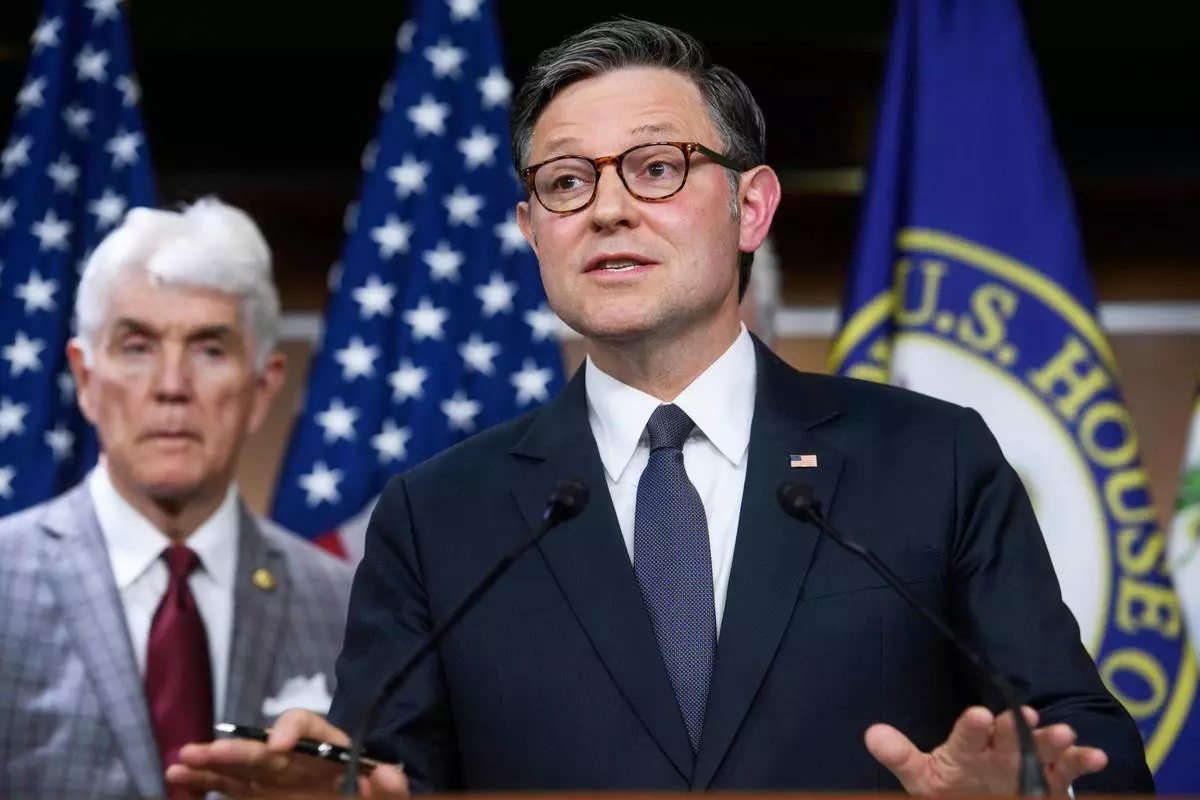
FiLE - Speaker of the House Mike Johnson, R-La., speaks during a news conference at the Capitol, May 6, 2025, in Washington. (AP Photo/Rod Lamkey, Jr., File)
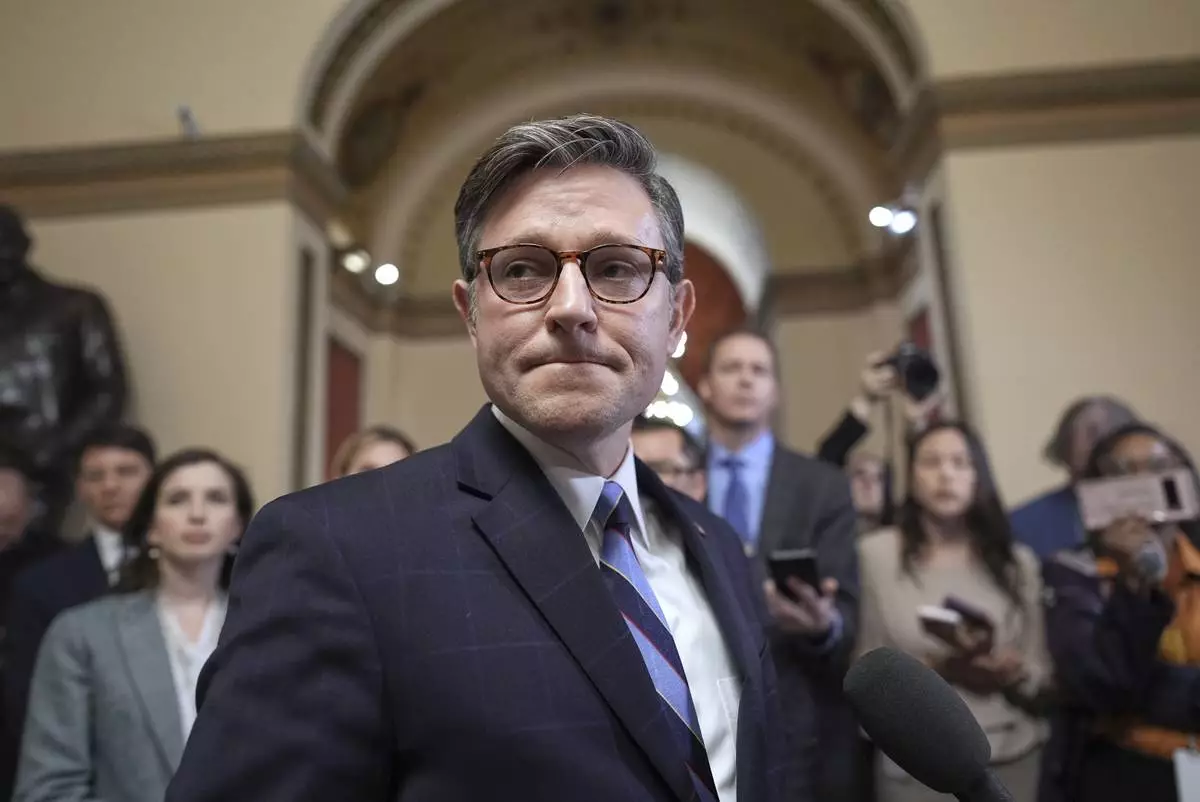
FILE - Speaker of the House Mike Johnson, R-La., talks to reporters just after House Republicans narrowly approved their budget framework, at the Capitol in Washington, April 10, 2025. (AP Photo/J. Scott Applewhite, File)
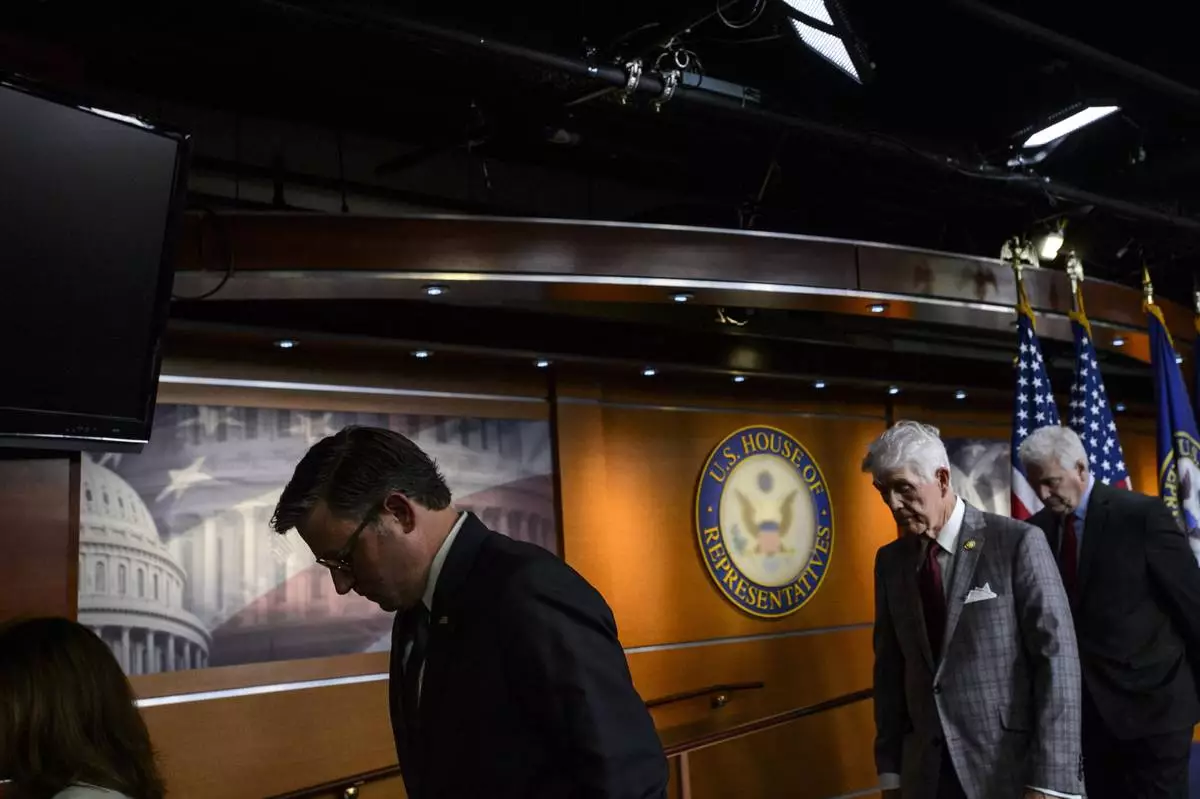
Speaker of the House Mike Johnson, R-La., left, House Small Business Committee Chairman Roger Williams, R-Texas, center, and House Majority Whip Tom Emmer, R-Minn., right, depart a news conference at the Capitol, Tuesday, May 6, 2025, in Washington. (AP Photo/Rod Lamkey, Jr.)
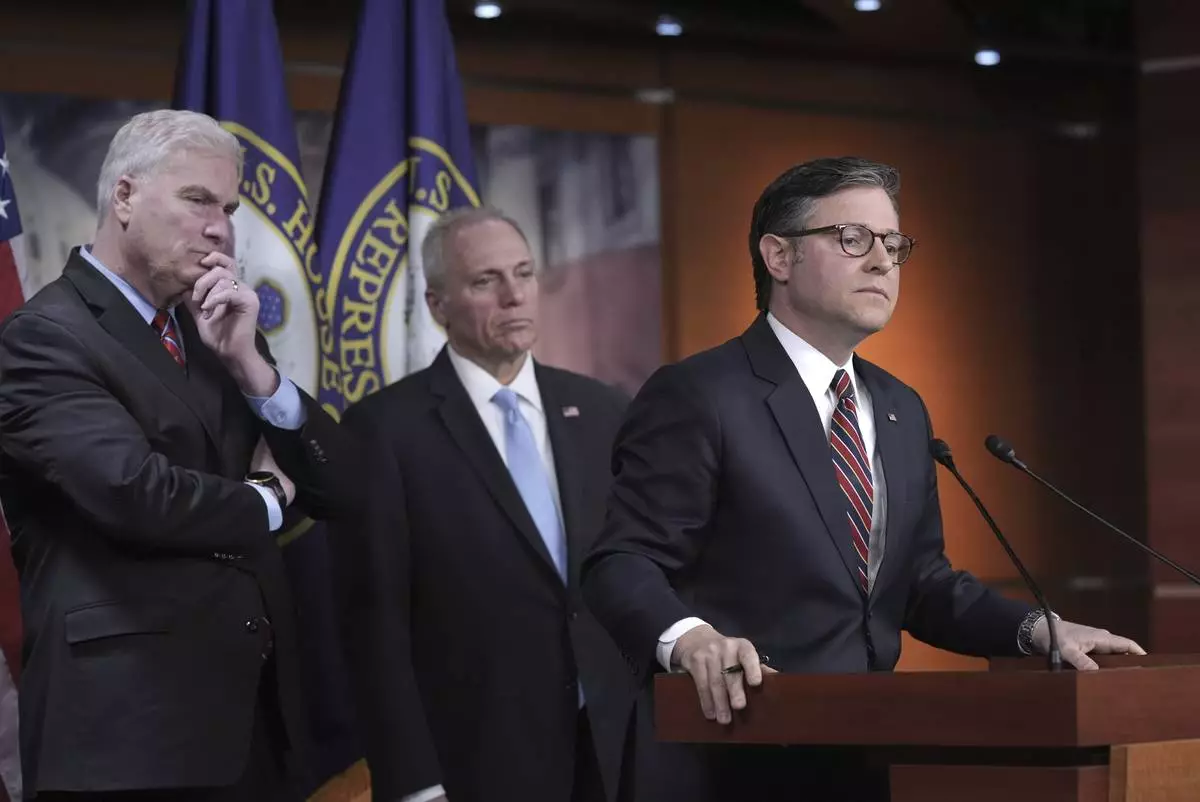
FILE - Speaker of the House Mike Johnson, R-La., joined from left by House Majority Whip Tom Emmer, R-Minn., and House Majority Leader Steve Scalise, R-La., talks to reporters about his push for a House-Senate compromise budget resolution to advance President Donald Trump's agenda, even with opposition from hard-line conservative Republicans, at the Capitol in Washington, April 8, 2025. (AP Photo/J. Scott Applewhite, File)
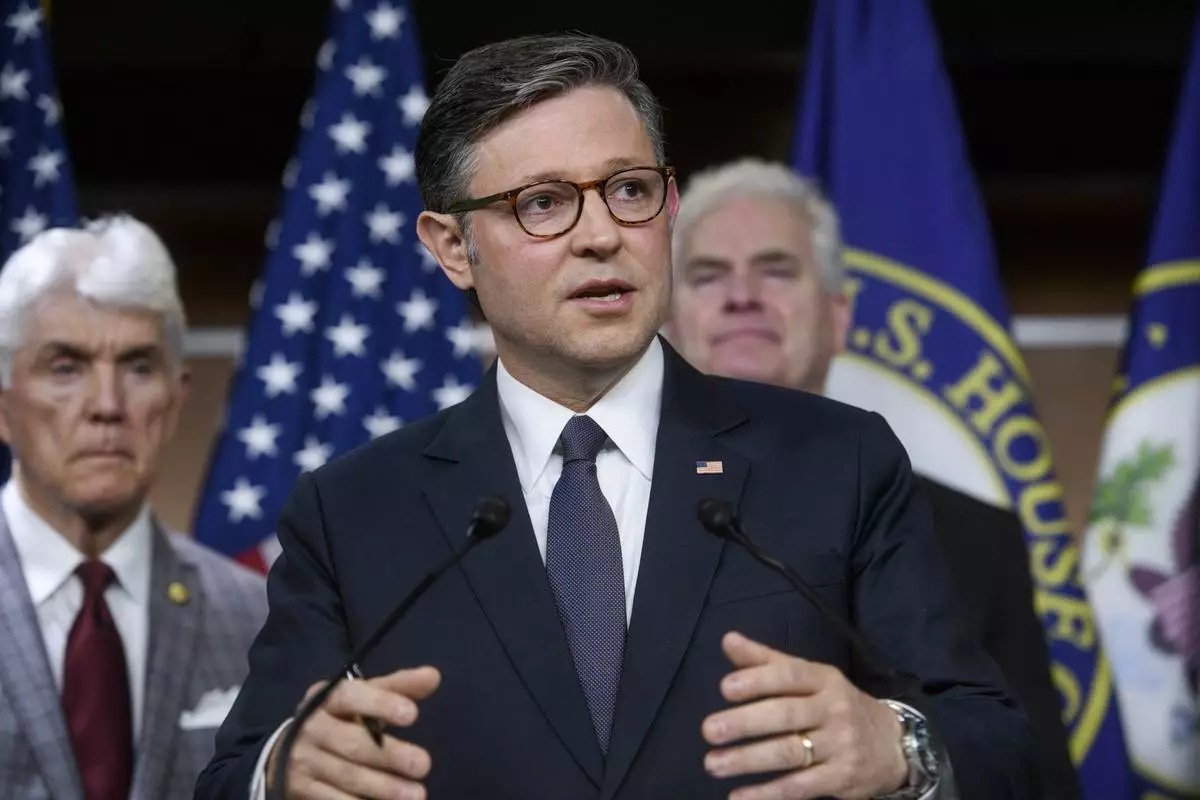
Speaker of the House Mike Johnson, R-La., speaks during a news conference at the Capitol, Tuesday, May 6, 2025, in Washington. (AP Photo/Rod Lamkey, Jr.)




